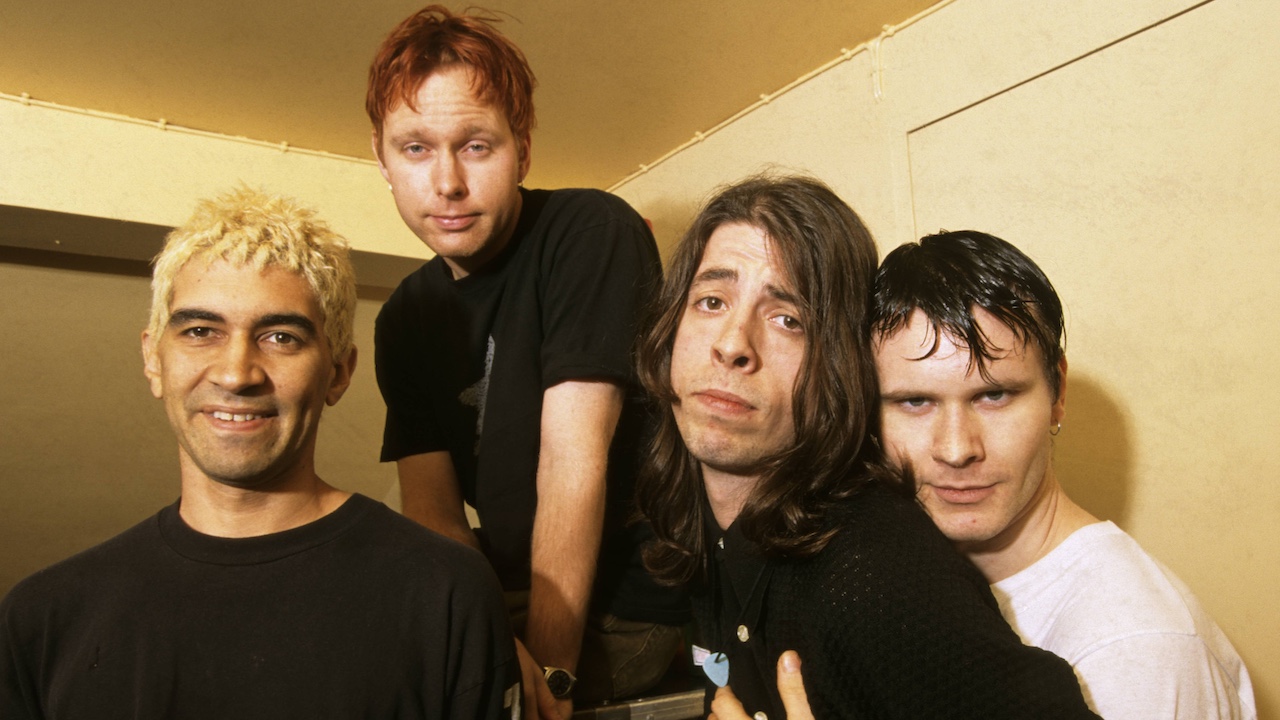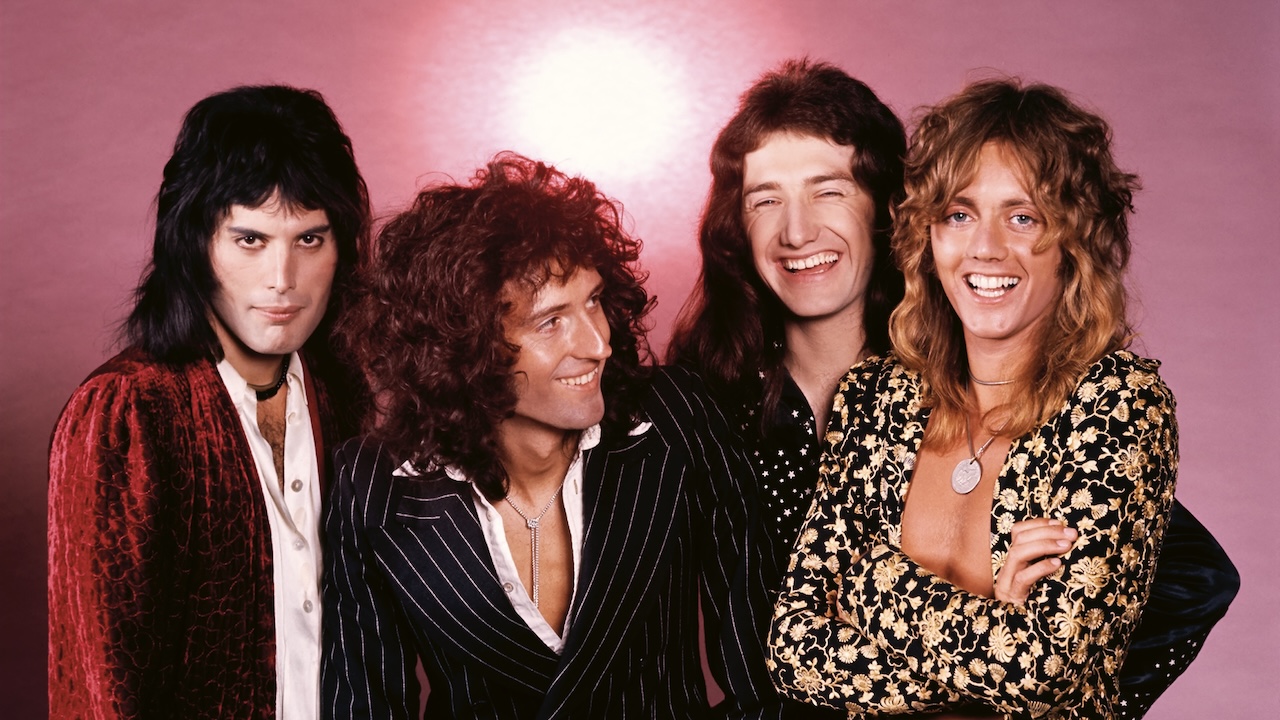“To have Kurt’s beautiful voice over one of my songs would have been amazing”: the story behind every track on Foo Fighters’ monumental debut album
It’s 30 years since Dave Grohl kicked off a game-changing second act, and this was the record that started it all.

Select the newsletters you’d like to receive. Then, add your email to sign up.
You are now subscribed
Your newsletter sign-up was successful
Want to add more newsletters?

Every Friday
Louder
Louder’s weekly newsletter is jam-packed with the team’s personal highlights from the last seven days, including features, breaking news, reviews and tons of juicy exclusives from the world of alternative music.

Every Friday
Classic Rock
The Classic Rock newsletter is an essential read for the discerning rock fan. Every week we bring you the news, reviews and the very best features and interviews from our extensive archive. Written by rock fans for rock fans.

Every Friday
Metal Hammer
For the last four decades Metal Hammer has been the world’s greatest metal magazine. Created by metalheads for metalheads, ‘Hammer takes you behind the scenes, closer to the action, and nearer to the bands that you love the most.

Every Friday
Prog
The Prog newsletter brings you the very best of Prog Magazine and our website, every Friday. We'll deliver you the very latest news from the Prog universe, informative features and archive material from Prog’s impressive vault.
Dave Grohl made the first Foo Fighters album more out of necessity than anything else. The ex-Nirvana drummer was in a dark place after the death of Kurt Cobain, uncertain of what his next step would be and unsure if he’d ever play music again. He certainly couldn’t face to listen to any.
“Losing Kurt was earth-shattering,” he told 60 Minutes presenter Anderson Cooper in 2014. “I was afraid of music after he died. If I heard a song that even touched on an emotion in me, I would turn it off. I was so terrified because to me, that’s what music always was. It was a direct connection to my heart.”
But it was about to be revived in a big way. It was on honeymoon in Ireland in summer 1994 that Grohl would emerge from his creative block, writing This Is A Call in his Dublin hotel room. After recording a guest spot on Mike Watt debut solo album Ball-Hog Or Tugboat? back home in Seattle a month or so later, he decided to go into the studio himself, booking a week-long stint at Robert Lang Studios with a rough plan of working fast and seeing what happens, a no-pressure environment to ease himself back in. “I needed to punch through this place I’d been trapped in for a while,” he told Classic Rock’s Grohl interviewer-in-chief Paul Brannigan in 2009. “I thought this would be the best therapy for me.”
No-one could’ve foresaw that Grohl would’ve emerged with one of the finest alt-rock debuts of a decade in which alt-rock debuts set a gold standard. The record turned 30 this week but the self-titled Foo Fighters sounds just as thrilling now as the first time it burst out of the speakers, an explosive, heavy rock album full of bright, sunny melodies at a time when grunge had gone dark and dirgey, a record that refused to be contained or too contemplative, one all about the here and the now and the what’s next. No-one knew, obviously, that the what’s next would be Foo Fighters becoming one of the world’s biggest bands. But it all began when Dave Grohl made the leap and recorded their debut album all by himself (almost). Here’s the story of every song on the record that launched his second act...

This Is A Call
With its clean guitars and sweet harmonies, the verse of This Is A Call made it immediately clear that Foo Fighters was not picking up where Nirvana left off. This was something different, its crunching, cavorting chorus more like an amped-up take on Weezer-style power-pop than grunge moodiness. There are older songs on the record – only three tracks on Foo Fighters were written after Cobain’s suicide - but writing this was the crucial breakthrough moment for Grohl’s new project. “Coming after Kurt’s death, This Is A Call was like a renewal or a reawakening where I actually found joy in playing and writing,” Grohl told Apple Music a few years ago. Released as the band’s debut single, it became a huge hit in both the UK and the US. Foo Fighters were go.
I’ll Stick Around
With its avalanching drum fills, jagged riffs and hollered chorus hook, I’ll Stick Around is one of the album’s best songs. From the off, it was also one of the band’s most-talked about. Grohl is directing its snarling lyrical message at someone and everyone had a good idea to who. “The only reason I wanted to do an interview was because as I was singing ‘I don’t owe you anything’, I realised people might think it was about Kurt,” Grohl told Rolling Stone in one of his earliest interviews as a Foo Fighter. “It would fucking break my heart to think that people are under that impression.” Except most people didn’t think it was about Kurt – they thought it was about Courtney Love. “It’s just a very negative song about feeling you were violated or deprived,” he said, declining to name the subject until our man Brannigan got the scoop in his excellent 2011 biography This Is A Call: The Life And Times Of Dave Grohl. “I don’t think it’s any secret that I’ll Stick Around is about Courtney,” he stated. “I’ve denied it for 15 years but I’m finally coming out and saying it. Just read the fucking words!”
Big Me
We’re certainly a long way from Gallons Of Rubbing Alcohol Flow Through The Strip here, a charming little ditty that Grohl described as a “short, tongue-in-cheek, ridiculously candy coated pop tune”, hence its accompanying candy-themed video. Despite sounding like the sort of thing you assume In Utero-era Kurt Cobain would set on fire, Big Me actually has its origins in the final moments of Nirvana – Grohl revealed during a show in Seattle in 2024 that he and Nirvana bassist Krist Novoselic worked on a version at the final recording session the band ever had, at Robert Lang Studios (where Grohl would later make Foo Fighters) whilst the pair were at a loose end because Cobain hadn’t showed. When he did turn up on the third and last-scheduled day, Nirvana recorded You Know You’re Right.
The latest news, features and interviews direct to your inbox, from the global home of alternative music.
Alone + Easy Target
The rampaging anthem Alone + Easy Target also existed for a time in Nirvana’s sphere. In December 1991, Grohl played Cobain a demo of the song and was met with an enthusiastic reaction. "Kurt was staying in a hotel in Seattle at the time, as by then he'd moved to LA," Grohl told Mojo. "I'd told him I was recording and he said, 'Oh, I wanna hear it, bring it by...'. He was sitting in the bathtub with a Walkman on, listening to the song, and when the tape ended he took the headphones off and kissed me and said, 'Oh, finally, now I don't have to be the only songwriter in the band!' I said, ‘No, no, no, I think we're doing just fine with your songs.’ Despite being one of the album’s most indelible songs, it was only released as a promotional single in the US rather than getting a proper release.
Good Grief
One of the songs written after Cobain had died, the rattling Good Grief saw Grohl trying to summon something celebratory in the face of trauma. He told Apple Music in 2021, it was a song about “feeling good about feeling bad”. The track also delved into what he described as his insecurity behind the kit in Nirvana, as nodded to in the line “The thought of bein’ ousted comes and goes”. “I was their fourth drummer, they’d had a team of drummers before me and some of them were more in the band than others,” he said. “When I joined the band, I didn’t know Krist and Kurt at all and when we first met and started playing, it was clear that it worked really well and we sounded like what most people know now as Nirvana… But every band I’d been in before then was with friends, so there’s some security in that. When you join a band where you don’t know anyone and you’re just starting to get to know each other and it sounds great when you play music and then the band becomes huge really quickly, you’re so nervous you’re either gonna get fired or it’s gonna stop. I didn’t want to get fired!”
Floaty
A psychedelic rocker that slides into a ferocious chorus, Floaty is one of the tracks the Foos have moved away from the further they get from their debut album. Apart from getting an airing during the Skin & Bones tour, it’s rarely played live. Its hazy, fantastical vibes reflect the fact it’s about a dream Grohl had where he was visited by aliens. Its warm, strummed chords were inspired by the British shoegazing crew Lush with a version originally written and demoed in 1992 and re-recorded for the album.
Weenie Beenie
Taking its name from a chain of fast food joints in Arlington, Virginia, the stomping, barbed Weenie Beanie was another song Grohl was at pains to point out had been around for years when it was released and people started honing in on its outro line, ‘One shot, nothing!’. “Everyone wants so badly to make some kind of correlation,” he said in 1995. “I’ve taken heat for a lot of lyrics I wrote four years ago. It frightens me to think that the line ‘One shot, nothing’ would be taken wrong. I wrote that in 1991’.
Oh, George
Despite Grohl once claiming that it was his least favourite Foo Fighters song, the breezy, minor chord mid-tempo sway of Oh, George is a nice little gear change in the middle of the record. Its title is meant as a tribute to late Beatles man George Harrison, with the track’s chord structure inspired by the slide solo in Harrison’s superlative Something.
For All The Cows
Written in early 1993 and demoed at Barrett Jones’ Laundry Room Studios not long after, you could surmise that For All The Cows’ inherent, lolloping silliness was a way for Grohl to let off some steam at a point when Nirvana were deep in In Utero territory. Amidst the rambling lyrics, there are hints that the effect money can have on someone was on Grohl’s mind, and its chorus is one of most immediate in his output at the time. But it is still a bit silly. It was released as a single in the UK, Europe and Australia.
X-Static
One of the least performed songs in their catalogue, the rolling groove of X-Static was another of the few songs written by Grohl between Cobain’s death and the record being made. It’s also the only track on the album to feature another member, with Afghan Whigs frontman Greg Dulli playing guitar. He was present for some of the sessions and was taken aback at Grohl’s one-man show. “He’d do a whole song in about 40 minutes,” he said. “I was completely fascinated by it. He could do it because he has perfect time. He’d lay down a perfect drum beat and work off that. He’d play drums, run out and play bass, and then put two guitar layers over the top and sing it. I was just watching him record and he asked me if I wanted to play. I didn’t even get out of my chair. He just handed me a guitar.”
Wattershed
With its snaking, muscular guitar line, surging rhythm section and vocal growl, Wattershed is very much the template for heavy Foo Fighters songs to come. It’s a song about music, Grohl acknowledging his love of (and background in) hardcore and punk, its title is also a nod to Mike Watt.
Exhausted
A closer that pinballs between a wistful wash of distorted guitars and weary vocal and spiky riffing, Exhausted was one of Cobain’s favourite Grohl demos, with the Nirvana frontman apparently once saying to Foos guitarist and ex-Nirvana sideman Pat Smear that he wanted to bring it into Nirvana with changed lyrics but was nervous about asking Grohl. “I wish he had because I would have said, 'Absolutely.',” Grohl told Mojo. “To have that beautiful voice over one of my songs would have been amazing.”
Niall Doherty is a writer and editor whose work can be found in Classic Rock, The Guardian, Music Week, FourFourTwo, Champions Journal, on Apple Music and more. Formerly the Deputy Editor of Q magazine, he co-runs the music Substack letter The New Cue with fellow former Q colleague Ted Kessler. He is also Reviews Editor at Record Collector. Over the years, he's interviewed some of the world's biggest stars, including Elton John, Coldplay, Radiohead, Liam and Noel Gallagher, Florence + The Machine, Arctic Monkeys, Muse, Pearl Jam, Depeche Mode, Robert Plant and more.
You must confirm your public display name before commenting
Please logout and then login again, you will then be prompted to enter your display name.












